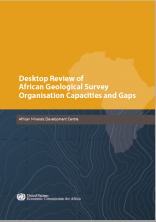Desktop Review of African Geological Survey Organisation Capacities and Gaps

The African Minerals Development Centre (AMDC) is implementing the Africa Mining Vision (AMV), which was adopted by African Heads of State at the twelfth ordinary session of the Assembly of the African Union, in February 2009. The Geological and Mining Information System is a key cluster of the Action Plan for the Implementation of AMV (2012). Geological survey organisations (GSOs) in Africa are important to the success of AMV and any work on geological information. As such, this report aims to make an initial assessment of the capacity of African GSOs
relative to the geological information needs of each country and identify some next steps for AMDC and its partners (from within and outside of Africa) to take to address gaps. The report and its findings are based on a literature review of existing capacity assessments of African
GSOs and a desktop gap analysis of geological information needs relative to the information available from African GSOs.
The literature review and gap analysis show that most African GSOs are deficient in capacity and geological information. This limits the ability of African countries to reach their minerals and development potential; it may also limit the sustainability of mineral related income to various African countries. Nearly half of all African economies rely on mining, quarrying and petroleum for 5 per cent or more of their measured GDP, yet at the same time “African states lack basic geological mapping or, at best, are poorly mapped”, according to AMV (AMV, 2009, p.15). In fact, only six African GSOs were rated by Geoscience Australia (Kay and others, 2012) as having either a strong capacity (South Africa) or the “capacity to undertake major geoscientific surveys and disseminate data efficiently” (Egypt, Ethiopia, Morocco, Namibia and the United Republic of Tanzania). All other countries were rated as either having some capacity, limited capacity, or no information or GSO was detected. From these results, it is clear that many African countries that have existing minerals industries are risking the sustainability of these industries due to a lack of public geological information and the need for adequate policies, legislation, regulation, licensing and minerals practices. Furthermore, other countries with the potential for minerals development are postponing the establishment of artisanal and small scale mining (ASM)1 development and industrial scale minerals development due to a lack of geological information.